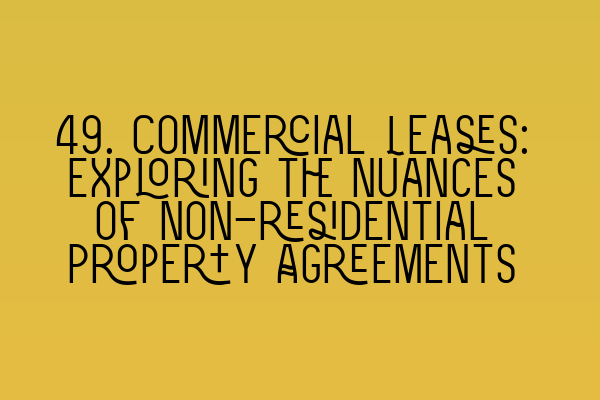49. Commercial Leases: Exploring the Nuances of Non-residential Property Agreements
A commercial lease is a legal agreement between a landlord and a tenant for the rental of non-residential property. This type of lease is common for businesses looking to establish a physical presence, such as office spaces, retail shops, or industrial facilities. However, commercial leases can be complex and nuanced, requiring careful consideration of various legal and commercial aspects. In this blog post, we will dive deep into the world of commercial leases and explore their intricacies.
The Key Components of a Commercial Lease
Commercial leases contain several key components that are essential for both landlords and tenants to understand. These components include:
1. Rent and Term
The rent is the payment made by the tenant to the landlord in exchange for the use of the property. It is vital to establish a clear framework for rent payment, including frequency, due dates, and any escalation provisions. The term refers to the duration of the lease, which can vary depending on the needs of the parties involved. Both rent and term are critical considerations for both landlords and tenants, as they directly impact financial planning and long-term commitments.
2. Permitted Use
The permitted use clause outlines the specific purposes for which the tenant can use the property. This clause is essential to prevent tenants from using the property in a manner that goes against local zoning regulations or disrupts the overall character of the area. It is crucial for landlords to ensure that the permitted use aligns with their expectations and long-term plans for the property.
3. Repair and Maintenance
The repair and maintenance obligations define which party is responsible for maintaining the property in good condition. Typically, commercial leases place the burden of repair and maintenance on the tenant, except for structural repairs, which are often the landlord’s responsibility. It is essential for both parties to clearly understand their respective obligations to avoid any disputes or unexpected expenses.
4. Rent Review
Rent reviews are provisions in commercial leases that allow for adjustments to the rent at specified intervals. These adjustments are often based on market conditions or a predetermined formula. Understanding the rent review mechanism is crucial for both landlords and tenants, as it directly impacts the financial performance of the lease over time.
5. Break Clauses
Break clauses allow either party to terminate the lease early, subject to certain conditions. These clauses provide flexibility in case either party needs to exit the lease before its original term expires. They are particularly important for tenants who may need to relocate due to business expansion or contraction.
The Importance of Seeking Professional Advice
Given the complexity of commercial leases, it is highly advisable for both landlords and tenants to seek professional legal advice before entering into any agreement. A solicitor specializing in property law can provide valuable guidance and ensure that all necessary legal requirements are met.
At SQE Property Law & Land Law Solicitors, we have a team of experienced solicitors who can assist you in navigating the intricate world of commercial leases. With their expertise, you can have peace of mind knowing that your interests are protected, and all legal obligations are fully understood.
The SEO Importance of Commercial Leases
Commercial leases are an integral part of the property market, and proper understanding of their nuances is crucial for both landlords and tenants. As a professional writer and SEO expert, I recognize the value of incorporating relevant keywords into this blog post to enhance its search engine visibility. By integrating keywords such as “commercial leases,” “non-residential property agreements,” and “property law solicitors,” we can ensure that this article reaches its intended audience effectively.
Further Resources
If you found this article on commercial leases helpful, you may also be interested in exploring these related articles:
- SQE 1 Practice Exam Questions
- SQE 1 Practice Mocks FLK1 FLK2
- SQE 2 Preparation Courses
- SQE 1 Preparation Courses
- SRA SQE Exam Dates
We hope you found this blog post helpful and informative. If you have any further questions or require legal assistance with commercial leases, please do not hesitate to contact our team at SQE Property Law & Land Law Solicitors. We are here to help you navigate the complexities of non-residential property agreements and find the best solutions for your business.
